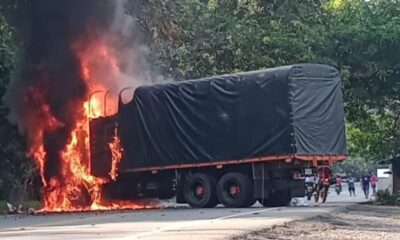Attacks Disrupt Major Caño Limon-Coveñas Oil Pipeline in Eastern Colombia
Over the last week, assailants carried out seven attacks against the major Caño Limón-Coveñas oil pipeline, according to state-controlled energy giant Ecopetrol. The company says that the attacks left holes in the 485-mile-long pipeline in the municipalities of Teorama in the department of Norte de Santander and Arauquita in Arauca, disrupting normal operations but not causing major damage to the overall system.
Photo: Ecopetrol released an image of the area, highlighting where the seven reported attacks took place. (Credit: Ecopetrol)
Ecopetrol did not identify who committed to the attacks, but military sources, according to Reuters, believe that guerrillas from the National Liberation Army (ELN) were responsible. The rebel group, which is expected to begin formal peace talks with the government on February 7, has attacked pipelines throughout the country in recent years.
The company says that it also found several valves that had been installed illicitly to siphon off oil. This method of stealing petroleum is a regular practice used by various criminal organizations. Ecopetrol noted in a statement that the valves often cause “great environmental damage by contaminating rivers and lands.”
With military assistance, technicians from the company are working to inspect and repair the pipeline. “Ecopetrol emphatically rejects these actions that endanger the lives of people, seriously affect the environment, and impede the well-being and development of communities,” said Ecopetrol in a statement.
Occidental Petroleum, a Houston-based energy company, transports oil through the pipeline from the Caño Limón field to the port of Covenas on Colombia’s Caribbean coast. The firm says it has extracted some 1.3 billion barrels of oil from the field, the nation’s second largest, since its discovery in 1983.
Ecopetrol said that the Caño Limón-Coveñas pipeline suffered 43 attacks during 2016 in the departments of Norte de Santander, Arauca, Boyacá, and Cesar. It also identified and removed 33 illicit valves last year.
























